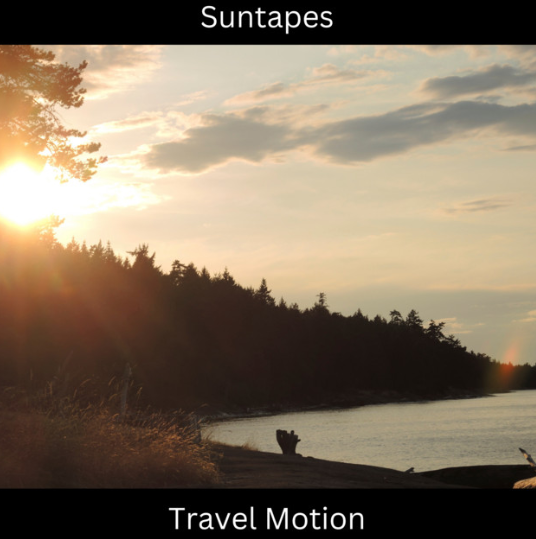We Speak Music
Suntapes’ Travel Motion Is a Masterclass in Ambient Storytelling

Belgian ambient architect Tomas Johan Kristian Vanderplaetse, aka Suntapes, has delivered his most refined, atmospheric statement to date with Travel Motion. Known for merging acoustic piano textures with analogue electronics and global instruments, Suntapes continues to dissolve genre boundaries while maintaining an emotional intimacy that’s increasingly rare in ambient music. This latest full-length record feels less like a collection of tracks and more like an ecosystem—lush, cinematic, and deeply immersive.
The album’s strength lies in its remarkable sonic detail and the sense of place it conjures. Tracks like “Overland” and “Plaza” are layered but never cluttered, using warm Schimmel pianos, Mellotron flutes, and Hofner basses to cultivate an atmosphere of quiet grandeur. There’s a restraint to these compositions—nothing overstays its welcome, yet every element feels vital, like it’s been chosen with an archivist’s care. It’s easy to forget how rare that is.
What’s most striking about Travel Motion is the integration of Vanderplaetse’s classical side, with four compositions credited under his full name. Pieces like “Motion” and “Fathom” unfold with an almost Satie-like sparseness, evoking emotional movement through repetition and minimalism rather than dramatic crescendo. The classical grounding adds gravitas, keeping the album from floating into background-music territory.
But Suntapes never settles into predictability. “Varkala,” with its tanpura drones and Indian harmonium, adds a spectral, meditative richness that expands the record’s textural palette. Similarly, “Galiano” finds beauty in stillness, its thumb piano and ruan textures drawing influence from Vanderplaetse’s field recordings and personal travels. This is not just ambient music—it’s music of memory and place.
The closer, “Cavern,” delves into the darker side of that memory. With its low-register piano and swelling organ drones, it hints at existential awe, a descent into subterranean dreamspace. Rather than closing with resolution, Travel Motion ends with ambiguity—a reminder that movement is ongoing, and inner landscapes often defy cartography.
Suntapes isn’t reinventing ambient music here, but he is subtly expanding its emotional vocabulary. In Travel Motion, he’s mapped not just physical destinations, but the spaces between feeling and reflection. It’s an album to live inside.
We Speak Music
Mutual Shock’s Nervous Systems Showcases The Architecture of Alienation

Seattle’s ever-shifting musical landscape has long given rise to voices that thrive in the gray areas—between genres, between moods, between identities. Dan Powers, the artist behind Mutual Shock, adds a new entry into that canon with Nervous Systems, a debut album that operates as both sonic exorcism and sociocultural diagnosis. At its core, the record is a meditation on life under late capitalism—a terrain where dread, detachment, and digital blur are not just thematic textures, but everyday conditions.
Emerging from the shadowy emotional terrain explored on his 2024 EP Stimulus Progression, Powers takes his vision further here—not louder, but deeper. Nervous Systems doesn’t seek to overwhelm. Instead, it seeps in. It’s less an album you “hear” and more one you slowly inhabit, like a strange new architecture that reveals its structure room by room. The choice of analog synths and skeletal drum programming isn’t retro affectation; it’s a design choice rooted in feeling, in tension, in deliberate control.
Mutual Shock sits in conversation with a lineage of outsider electronic music—Drab Majesty’s theatrical alienation, Molchat Doma’s post-Soviet nostalgia, the mechanized introspection of Nine Inch Nails—but avoids being pinned down by any one aesthetic. Powers is less interested in genre homage than he is in emotional architecture. Each sound feels like a corridor leading somewhere disorienting yet familiar, like a half-remembered dream of an office building at night.
Thematically, the album is deeply of this moment. It’s about burnout, yes, but not in the way we meme it. It’s about the deeper erosion beneath the hustle: the spiritual confusion, the existential rootlessness, the constant digital hum that keeps us from ever fully arriving in our own lives. Powers channels these anxieties not with histrionics, but with careful understatement—letting the atmosphere do the heavy lifting. It’s as much sociology as it is art.
What makes Nervous Systems so vital is that it doesn’t offer escape. Instead, it offers recognition. In a time when much of culture aims to distract, Mutual Shock chooses to reflect. Powers holds a mirror to the disquiet and lets it speak—not with panic, but with precision. The result is an album that lingers long after the final note, not as a soundtrack to alienation, but as a language for it.
INSTAGRAM | FACEBOOK | YOUTUBE | WEBSITE | BANDCAMP | SPOTIFY
-

 We Speak Soccer1 week ago
We Speak Soccer1 week agoNo Entry Allowed: How Austin Fortner Is Becoming a Standout Keeper with Confidence and Control
-

 We Speak Football1 week ago
We Speak Football1 week agoFrom Snap to Touchdown: How Niah Reyes Plays the Game with Heart and Hustle
-

 We Speak Coaches1 week ago
We Speak Coaches1 week agoCoach of Culture, Heart of a Movement: The Extraordinary Journey of Daniel Moore, Pioneer of Women’s Flag Football and Builder of Young Lives
-

 We Speak Soccer3 days ago
We Speak Soccer3 days agoFrom Small Steps to Big Goals: How Alianna-Reyne Basa Became a Fearless Striker with a Champion’s Heart

